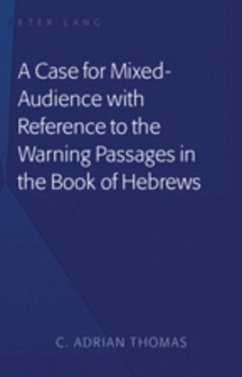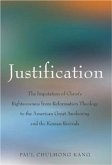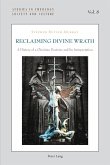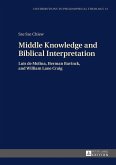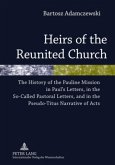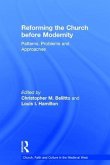A Case for Mixed-Audience with Reference to the Warning Passages in the Book of Hebrews discusses the nature of the warnings in Hebrews and how these warnings relate to the theological question of the eternal security of believers. The main argument is that these warnings are intended to target a particular segment of the author's community, about whose appropriation of and subsequent attitude toward the Christian message he was deeply concerned. That is to say, while the book of Hebrews is addressed as a message of encouragement to the community as a whole, its warnings are aimed at a certain element in the community whose salvation is threatened by a possible dangerous course of action. The book implies that while the author is persuaded that the majority in the community are genuine believers, there are some about whose salvation he doubts; hence the «case for a mixed-audience». What is threatened, therefore, is not a salvation already possessed, but the salvation of those in danger of coming up short.
Theologically, the work falls within the sphere of the Calvinistic-Arminian debate regarding the assurance of salvation and the perseverance of the saints. It argues strongly for the Calvinistic position, but does so within the confines of the discipline of biblical studies, and lends extensive exegetical support to the Calvinistic position on the warning passages. The book is highly recommended for Bible College and seminary students and professors, as well as pastors and lay leaders who must give answers to their parishoners on those tough warning passages in Hebrews.
Theologically, the work falls within the sphere of the Calvinistic-Arminian debate regarding the assurance of salvation and the perseverance of the saints. It argues strongly for the Calvinistic position, but does so within the confines of the discipline of biblical studies, and lends extensive exegetical support to the Calvinistic position on the warning passages. The book is highly recommended for Bible College and seminary students and professors, as well as pastors and lay leaders who must give answers to their parishoners on those tough warning passages in Hebrews.
«I recommend this book because of its careful, biblically sound treatment of an important theological and ministerial issue. In respectful but straightforward fashion C. Adrian Thomas discusses some of the misunderstandings that arise from biblical warnings addressed to Christian communities in the book of Hebrews and elsewhere in the New Testament. His diligent study of the key passages and their history of interpretation over the centuries provides a cogent and wide-ranging evaluation of competing viewpoints. In the process he sets the exegesis and theology of these warnings on a more solid footing.« (Buist M. Fanning, Department Chair and Professor of New Testament Studies, Dallas Theological Seminary)

